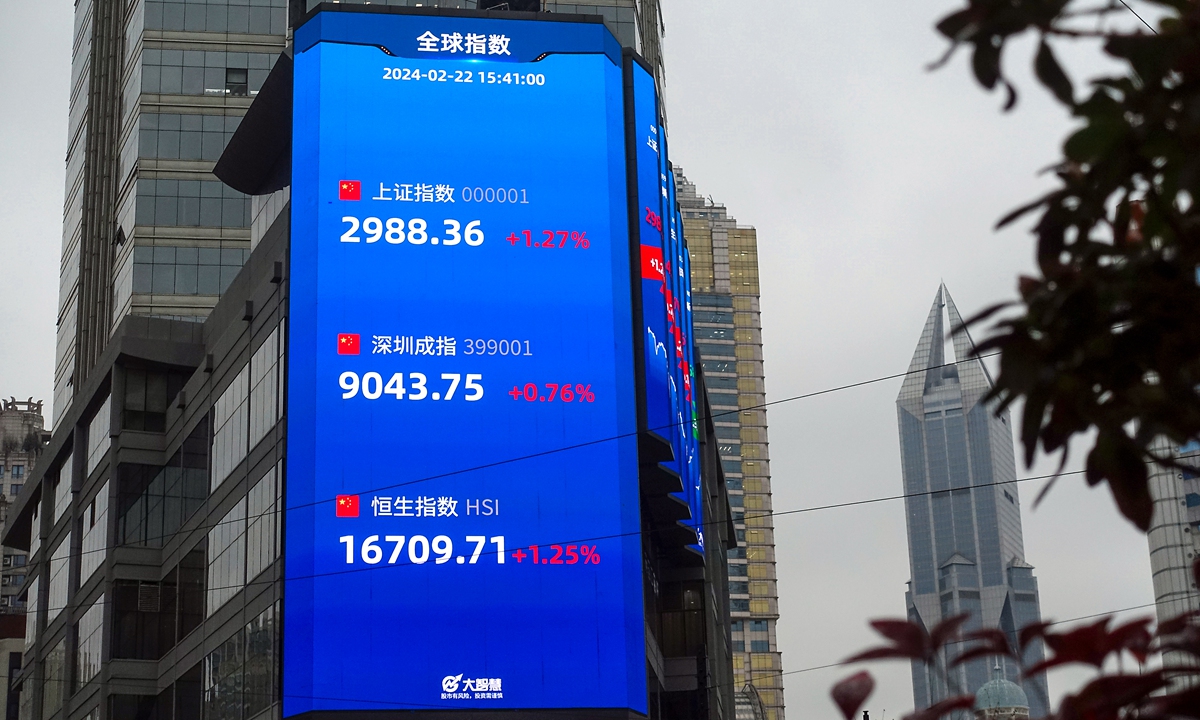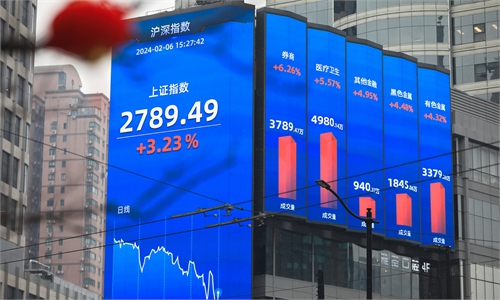
A large screen displays stock market indexes in Shanghai on February 22, 2024. Photo: VCG
The China Securities Regulatory Commission (CSRC) said on Thursday that domestic stock exchanges have taken regulatory measures to address abnormal trading by certain institutions, but these moves are not meant to restrict selling.
The remarks came after some foreign media outlets reported that the CSRC had restricted net selling by major firms at the open and close of trading and prohibited institutional investors from shorting A shares through stock index futures.
In a statement on Thursday, the CSRC assured investors that as a regulator, it will not interfere with normal transactions and will ensure investors' rights to trade in a fair and free manner in accordance with the law.
The CSRC said that exchanges are fulfilling their regulatory responsibility and clarified that there is no restriction on selling. The agency said it will strengthen the monitoring of abnormal transactions, and crack down on market manipulation, insider trading and other illegal activities.
The CSRC, led by its newly appointed chairman Wu Qing, held more than 10 back-to-back meetings within two days this week with a wide range of market participants to solicit suggestions on regulations, risk prevention and high-quality development.
Amid toughened crackdowns on abnormal trading, the market continued to rebound.
The Shanghai Composite Index closed at 2,988.36 points on Thursday, up 1.27 percent, rising for the seventh straight day and approaching the psychological benchmark of 3,000 points.
The Shenzhen bourse closed 0.76 percent higher at 9,043.75 points, while the tech-heavy ChiNext index gained 0.31 percent.
More than 4,500 individual stocks across Chinese markets gained on Thursday. The rally was led by shares in state-owned enterprise-invested cloud platforms, liquid-cooled servers, computing power leasing and coal.
Attracted by the trend, a number of foreign investment firms announced plans to expand in China, and analysts noted that the steady operation of China's economy underpinned the stock market and buttressed the confidence of international investors.
Listed companies that include leading enterprises in various industries, such as high-technology sectors with promising prospects, might be the main attraction for foreign investors, Li Chang'an, a professor at the Academy of China Open Economy Studies of the University of International Business and Economics in Beijing, told the Global Times on Thursday.
China's fund manager E Fund Management Co (E Fund) signed a memorandum of understanding with leading Saudi asset manager Riyad Capital to exchange expertise and cooperate in local investment areas, the Xinhua News Agency reported on Wednesday.
Liu Xiaoyan, chief executive officer of E Fund, said that the Chinese capital market's high-quality opening-up offers opportunities for fund management companies' globalized development, and pledged to facilitate Saudi investors' knowledge of and investment in the Chinese market.
Aside from Saudi investors, US Securities and Exchange Commission Form 13F filings - a quarterly report filed by institutional investment managers to the SEC - showed that some managers increased their holdings in several Chinese companies on the US stock market in the fourth quarter of 2023.
"Foreign capital will further inject vitality into the domestic capital market and will optimize the structure of capital sources," said Li, noting that foreign investors' attention to the Chinese capital market demonstrated their will to share China's development dividends.


